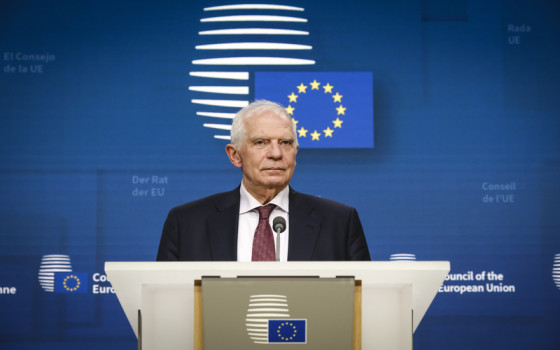
Borrell’s speech to the G20 foreign ministers is entitled “The Group’s Role in Dealing with Continuing International Tensions.” He focused on the war in Ukraine and the situation in Gaza and the West Bank

- Europe and Arabs
- Thursday , 22 February 2024 15:23 PM GMT
Brussels: Europe and the Arabs
In his speech before the G20 foreign ministers’ meeting hosted by Argentina in Buenos Aires, European Foreign Policy Coordinator Josep Borrell said, “The global scene today is characterized by multiple crises, confrontation, and escalation. Multipolarity is a living reality, but multilateralism - which it should support - is going through a crisis.” Yes, today we are facing serious crises. Allow me to mention two of them: the aggressive war against Ukraine, and the Israeli-Palestinian conflict in Gaza. The European official added in his speech published by his office in Brussels last night, “Almost two years ago, Russia launched its aggressive war against Ukraine.
War has returned to Europe, but this should worry every country in the world. It is a clear violation of the basic principles of the UN Charter: sovereignty and territorial integrity. It affects us all, in terms of economics, scarcity and destabilization.
At the same time, we cannot turn a blind eye to the tragedy suffered by the civilian population in Gaza. Many innocent lives have been lost. 90% of the population was displaced from their homes. This humanitarian disaster is not natural, it is not an earthquake, and it is not a flood. It is a man-made humanitarian catastrophe, and it must stop.
For this reason, 26 out of 27 EU members urge the Israeli government not to take military action in Rafah and demand an immediate humanitarian truce that would lead to a permanent ceasefire, the unconditional release of hostages, and the provision of further aid. Providing faster humanitarian aid.
The issue is not that Israel must abide by international law and humanitarian law. Of course, everyone should do this. The question is: Do they do that?
That's why two members of the European Union - two member states - put the question [on the table]. We will discuss this within the framework of the EU-Israel Association Agreement. This is particularly important following the binding International Court of Justice decision.
The European Union has warned about the situation in the West Bank. It's not just about Gaza, it's about the West Bank as well. The West Bank is boiling. Extremist settlers attack Palestinian civilians indiscriminately.
Some EU member states have already taken action by imposing sanctions on violent settlers. What's happening in the West Bank is the real obstacle — well, there are many obstacles, but this is an important one — to a two-state solution.
Dear Ministers, We may disagree on Ukraine. But we agree on the need for a two-state solution to the Israeli-Palestinian conflict. If there is a consensus that only a two-state solution will resolve this conflict - which is a [long-term] conflict as well - then we need to redouble our efforts to implement this solution.
If we reaffirm this goal here today - everyone - we must work out how to achieve it. Dear Mauro [Vieira, Brazilian Foreign Minister], Dear Minister, we would be grateful if you mentioned, in your press conference, that the G20 supports the two-state solution. We need a framework - and what better framework than the United Nations? As I said, dear Argentine Foreign Minister [Diana Mondino]. The Security Council [United Nations] could provide this framework by recognizing the principle of the two-state solution through a unanimous resolution that could give it international legitimacy.
We have to prevent regional escalation – many of you have said that. That's why the European Union has just launched a new naval operation in the Red Sea, [Operation] Aspids, to protect commercial ships. Many countries in the region are the first to suffer from it [the escalation in the Red Sea]. It is a defensive operation, and shows the European Union's commitment as a security body.
It is unfortunate that we have allocated financial resources that should have been better spent on sustainable development, only to be reallocated to enhancing defense and military production. This is a poor allocation of resources, but it is the result of some actions.
Our priorities should be a just peace in Ukraine - “just” and “peace” in Ukraine - and an end to the humanitarian catastrophe in Gaza. Both tragedies are man-made. But none of them are in our destiny. Ending these challenges would free up the political and financial resources needed to address the many challenges that need to be solved.
The G20, which represents more than 80% of global GDP, has a crucial role in this.
In his speech, the European official welcomed representatives of the African Union to their first meeting of the G20 as a permanent member. 25 years from now, one in four people in the world will live in Africa. That is why a strong African voice is essential when we discuss global challenges.












No Comments Found